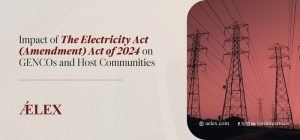Aelex Tasks NERC On Ambiguities In Hydroelectric And GENCOs Funds
OpenLife Nigeria reproduces a report by Aelex, a leading and dispute resolution law firm, in which it raises posers in the ambiguities on the “levies payable by electricity generating companies (“GENCOs”) to the National Hydroelectric Power Producing Areas Development Commission (“N-HYPPADEC”) Fund,” and calls on Nigerian Electricity Regulatory Commission, NERC, for clarifications
IMPACT OF THE ELECTRICITY ACT (AMENDMENT) ACT OF 2024 ON GENCOs AND HOST COMMUNITIES
The Electricity Act (Amendment)of 2024 (the “Amendment Act”) was enacted on February 9, 2024, to address the development and environmental concerns of host communities. It amends the Electricity Act of 2023 (the “Act”) by legislating Corporate Social Responsibility obligations on the part of generation companies.
The Amendment Act focuses on the adjustments of certain levies payable by electricity generating companies (“GENCOs”) to the National Hydroelectric Power Producing Areas Development Commission (“N-HYPPADEC”) Fund.
By section 89 of the Act, N-HYPPADEC was established to formulate policies and implement the development plans for hydroelectric power-producing areas.
Prior to the changes introduced by the Amendment Act, N-HYPPADEC was to be funded pursuant to section 95 of the Act as follows:
i. 10%of the total revenue generated by hydroelectric generation companies from their operations of hydroelectric dams in any member state;
ii. 50%of the money due to member states from the ecological funds set up by the Federal Government of Nigeria under section 5(4) of the Allocation of Revenue (Federation Account, etc.)Act of 1981;
iii. 5%of all revenue that accrues from GENCOs in Nigeria from the member states (in their business as GENCOs) is to be set aside for the development of the respective host communities;
iv. all money, by way of gifts, loans, grants-in-aid, testamentary disposition or otherwise, raised for the functions of the N-HYPPADEC; and
v. proceeds from other assets accruing to N-HYPPADEC.
The Amendment Act revises item(iii) above by providing that the 5% contribution due from GENCOs will be calculated based on their annual operating expenditure instead of on all revenue as previously provided in the Act.
The other amendment introduced relates to the management of the contributions by the GENCOs.
The administration of the funds contributed by the GENCOs is to be done by a Trustee jointly appointed by the contributing GENCOs and representatives of the host communities.
Also, the funds will be utilised for projects jointly selected by the GENCOs, host communities and the trustees.
The amendments will significantly alter the current regime and bring about changes for host communities and GENCOs, but certain administrative aspects remain unclear.
For instance, it is unclear whether the 5% levy imposed on GENCOs applies to hydroelectric GENCOs that are already subject to a 10% levy on their total revenue under section 92(2)(a) of the Act.
This dilemma remains notwithstanding the provision of section 92(2)(e) of the Act, which excludes Hydroelectric GENCOs from the application of the levy.
The exclusion is ambiguous as it does not specify the exact levy Hydroelectric GENCOs are excluded from paying.
Additionally, it is ambiguous whether the 5% contribution for host community development by GENCOs will still be paid through N-HYPPADEC, especially given the unamended introductory phrase of section 95(2) of the Act, which reads, “There shall be paid and credited to the Fund established under subsection(1)..” (emphasis added).
Also, it is still not certain how the contributions will be applied to the development of host communities in member states.
Will it be the aggregate contribution made by GENCOs that will then be applied to each state based on a formula that proportionally allocates developmental projects to each state based on their contribution, or will the application of the Fund be based on independent contributions by GENCOs to the respective member states for host community development?
Furthermore, the Amendment Act fails to specify the minimum qualification and registration requirements for appointed Trustees.
Moreover, if a GENCO is subject to regulation by a state electricity law that does not incorporate the provisions of section 95 of the Act (as amended), it is uncertain whether the GENCO remains obligated to contribute to the Fund.
We anticipate that the NERC will issue guidelines to address the uncertainties highlighted above.
In conclusion, the Amendment Act represents a significant milestone in Nigeria’s electricity sector.
By easing financial burdens on GENCOs and empowering host communities through collaborative management of development funds, these changes are poised to foster a more sustainable and equitable environment for electricity generation and distribution.







